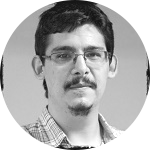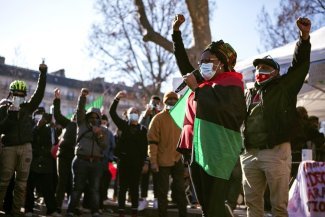Land is the greatest source of wealth in Paraguay, with an economy founded on the production and export of beef and genetically modified crops such as soya. But the industry is dominated by a small group of large landowners that, despite representing just 2.5 per cent of the population, own 85 per cent of all the country’s arable land, according to Oxfam.
Disputes between the large agribusiness companies, the state and farming communities are routine in Paraguay. A tragic example is the “Curuguaty case”, a massacre in 2012 not yet fully investigated, that left 17 police officers and farmworkers dead as a result of a dispute over public lands.
The massacre led to the removal from power, one week later, of the only progressive government Paraguay has had for half a century.
In a ruling made public this week, 11 peasants were convicted for their involvement in the clashes that led to the deaths of 17 people on 15 June 2012.
That day, some 300 police officers were sent to evict approximately 70 peasant farmers from lands they were occupying with a view to having them included in the agrarian reform, in the rural district of Curuguaty, in the department of Canindeyú, around 100 kilometres from the border with Brazil.
Whilst police officers and farmworkers were negotiating over the eviction, the head of the police operation was gunned down by shots fired from automatic weapons (the investigation by the Public Prosecutor has failed to explain from where the shots came).
The shooting unleashed armed clashes that left dead 11 peasant farmers and six police officers from the special operations unit, according to the testimonies given by dozens of witnesses during the trial that began in Asunción in mid 2015 and concluded on 1 July 2016.
The incident led to the impeachment and removal from the presidency of former bishop Fernando Lugo.
No investigation of 11 farmworker deaths
According to the Public Prosecutor, armed farmworkers had set up an ambush for about 300 special police sent to evict them. He accused them, during the trial, of intentional homicide, criminal association and illegal occupation of land, and called for prison sentences of between five and 30 years.
The defence, for its part, called for their acquittal, contending the whole process had been a travesty of justice, a view shared by international observers and human rights organisations.
The court in charge of the case condemned the 11 defendants to between four and 30 years in jail, at a session taking place in the midst of incidents and protests over the verdict. During the trial, the court only ruled on the deaths of the police officers, as the Public Prosecutor’s Office never investigated the deaths of the 11 peasants during the massacre.
The heaviest sentence was served to Rubén Villalba, condemned to 30 years in prison and five on probation for the intentional homicide of Erven Lovera, the superintendent in charge of the eviction that led to the massacre. Three other peasants were judged to be co-perpetrators: Luis Olmedo, condemned to 20 years in prison together with Néstor Castro and Arnaldo Quintana, who both received 18-year prison sentences.
The three women tried, Fany Olmedo, Dolores López and Lucía Agüero, were sentenced to six years’ imprisonment as accomplices to the homicide, whilst Felipe Benítez Balmori, Adalberto Castro, Alcides Ramírez and Juan Carlos Tillerería, were condemned to four years in jail for illegal occupation of land and criminal association.
The court also ruled that the defendants should cover the cost of the trial, considered to be the longest hearing in the history of Paraguay, initiated on 27 July 2015 in Asuncion and in which almost 200 witnesses testified.
The United Nations, the Inter-American Commission on Human Rights, European legislators and non governmental organisations, such as Oxfam or Amnesty International, have called for a case review and the civilians, the only ones tried for the massacre, to be acquitted, given the failure of the Public Prosecutor’s Office to investigate the role of the police and politicians in the death of the 11 peasants.
“There is no evidence against them. They should be acquitted straightaway. What they’re trying to do is to criminalise the fight of landless peasants, but every Paraguayan deserves to have a bit of land,” Martina Paredes, the sister of Fermín and Luis, two of the farmworkers killed in the massacre, told Equal Times.
She spoke during a protest held at the close of the trial by hundreds of people in front of the Public Prosecutor’s Office in Asunción.
According to Paredes, the Public Prosecutor’s Office did not investigate the deaths of the campesinos. It only conducted investigations into how the police officers were killed. There has been no investigation into the massacre itself, who provoked it, and why.”
“Fermín had been shot in the leg and was lying on the ground when he called me. I’m sure he was executed afterwards,” she added.
Paredes recalls that in addition to the 11 people tried, a young peasant girl, who was a minor when the crime took place, is still undergoing a separate judicial proceeding, the start of which was postponed on several occasions.
Land titles dispute
The victims’ relatives are calling on the justice system to determine who owns the lands where the massacre took place and that have been at the centre of a dispute between the Paraguayan state and the private company Campos Morombí.
The lands were donated to the state in 1967 by the company La Industrial Paraguaya (Lipsa) and were used as a military outpost by the navy, which is why they are commonly known by the name Marina Kue.
Campos Morombí, however, a company that owns a large estate bordering these lands, claimed ownership of them based on usucaption - the acquisition of a right to property by uninterrupted and undisputed possession for a prescribed term.
Campos Morombí belongs to the family of Blas N. Riquelme, a historic leader of the Colorado Party during the dictatorship of Alfredo Stroessner (1954-1989). The lands known as Marina Kue are part of the list of ill-gotten lands, those taken over illegally during the dictatorship, covering eight million hectares across the country, according to a report by the Truth and Justice Commission (CVJ), published in 2008.
The Curuguaty massacre was used as a pretext for the then-opposition and now ruling Colorado Party to launch impeachment proceedings against President Fernando Lugo.
Lugo’s removal from power was deemed “irregular” by international bodies such as UNASUR, and led to Paraguay to being suspended by Mercosur, which considered Lugo’s ousting to be a break with democracy in Paraguay.
Paraguay is the Mercosur country (a group that also includes Venezuela, Argentina, Brazil and Uruguay) with the highest concentration of land in the hands of a few.
It is the country with the biggest cows raised in the region, yet two out of 10 Paraguayans consume fewer calories than required to live a healthy life. That proportion places the country among those ranking the worst in the continent, just behind Haiti and Guatemala.
The most affected are the farmworkers: 80 per cent of Paraguayan campesinos, approximately 35 per cent of the population of 6.7 million inhabitants, have no land to farm. In Paraguay, only 6.3 per cent of arable land is used for small-scale farming, an amount far too low to supply fruit and vegetables to the whole country. Paraguay has long imported products from Argentina and Brazil that could be produced by its peasant farmers, according to the report published in June by the economic research and capacity-building NGO, Centro de Análisis y Difusión de la Economía Paraguaya (CADEP).
Some 31 million hectares are concentrated in the hands of the agribusiness sector, whilst the campesinos, who represent almost half of the population, hold just 1.9 million hectares.
Over the last decade, some 900,000 people have abandoned the countryside in Paraguay for precarious settlements in the capital, due to the expansion of the large-scale, highly mechanised soy and corn plantations requiring little labour, according to the national federation of campesinos FNC (Federación Nacional Campesina), which is calling for land reform.
This forced yet silent mass migration, like the Curuguaty massacre, is the result of the Paraguay’s extractive economic model.









